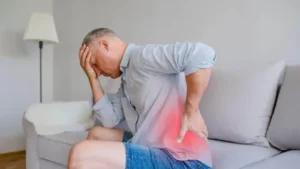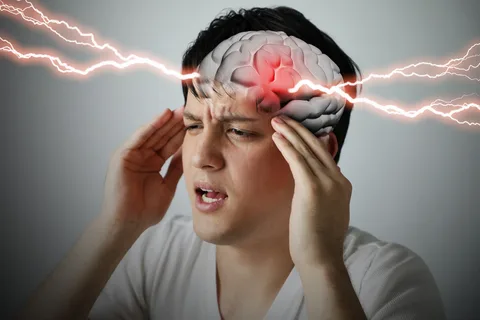Life can sometimes feel like a juggling act. With the pressures of work, family responsibilities, and unexpected challenges, stress often creeps in and takes its toll. But what if that tension isn’t just mental? For many individuals, stress manifests physically as chronic pain—a lingering issue that seems to become part of their daily routine. It’s a cycle that can leave you feeling trapped. Understanding the intricacy of Stress-Related Chronic Pain is essential for anyone seeking relief. This blog post will dive into how these two elements intertwine and explore effective treatments available to help break the cycle.
The Science Behind the Connection
The connection between stress and chronic pain is rooted in complex biological mechanisms. When faced with stress, the body releases hormones like cortisol and adrenaline. These hormones can cause inflammation, leading to discomfort and pain.
Additionally, stress alters brain chemistry. It increases sensitivity to pain signals, making even minor aches feel more intense. This heightened perception creates a vicious cycle: the more pain experienced, the greater the stress level tends to rise. Furthermore, chronic stress often results in muscle tension. Tight muscles can lead to headaches or back pain over time—conditions that many people experience regularly.
Neurotransmitters also play a role in this interaction. They help transmit signals throughout the nervous system but can become imbalanced during prolonged periods of stress. Understanding these physiological responses sheds light on why managing both emotional health and physical symptoms is crucial for effective treatment strategies.
 Common Types of Chronic Pain Linked to Stress
Common Types of Chronic Pain Linked to Stress
Chronic pain can manifest in various forms, often exacerbated by stress. Tension headaches are a prime example. They can arise from muscle tension in the neck and shoulders, which is frequently linked to stress.
Another common type is fibromyalgia. This condition causes widespread pain and fatigue, with many patients reporting that their symptoms worsen during stressful periods. Back pain is also prevalent among those dealing with constant stress. The body’s response to anxiety can lead to tightened muscles, resulting in discomfort.
TMJ disorders might not come to mind immediately, but they are closely tied to emotional strain. Stress can cause jaw clenching or teeth grinding, leading to painful inflammation. Gastrointestinal issues like irritable bowel syndrome (IBS) often flare up when under duress. The gut-brain connection highlights how our mental state profoundly affects physical health.
Impact of Chronic Pain on Mental Health
Chronic pain doesn’t just affect the body; it deeply influences mental health as well. The constant discomfort can lead to frustration, helplessness, and sadness. Living with persistent pain often creates a cycle where emotional distress exacerbates physical symptoms. Anxiety and depression frequently emerge in those experiencing long-term pain conditions. This internal struggle is not merely inconvenient; it significantly alters daily life.
Social activities may be avoided due to fear of worsening symptoms or feeling unwell. Isolation can intensify feelings of loneliness and despair, trapping individuals in a painful loop. It’s essential to recognise that mental health challenges are valid responses to chronic pain. Seeking support can make a world of difference in managing both aspects effectively. Understanding this connection is the first step toward holistic healing for many individuals navigating these intertwined issues.
Effective Treatments for Stress-Related Pain
Understanding and managing stress-related pain is essential for improving overall well-being. Various effective treatments can help alleviate symptoms and enhance quality of life.
Mindfulness and Meditation
Practising mindfulness or meditation regularly can significantly reduce stress levels. These techniques encourage relaxation, helping minimise pain perception while promoting emotional resilience.
Physical Therapy
Engaging in physical therapy can also be beneficial. A tailored exercise program not only strengthens muscles but also increases flexibility. This approach often leads to better management of chronic pain linked with stress.
Cognitive Behavioral Therapy (CBT)
Cognitive Behavioral Therapy has shown effectiveness in addressing both mental health issues and chronic pain. By changing negative thought patterns related to pain, individuals may experience reduced anxiety and improved coping strategies.
Medication Management
For some, medication may be a necessary part of treatment. Pain relievers or anti-anxiety medications prescribed by healthcare professionals can provide relief when combined with other therapeutic approaches.
Lifestyle Changes
Adopting a healthier lifestyle is crucial in combating stress-related pain. Regular physical activity, balanced nutrition, adequate sleep, and strong social support systems are key components that contribute to holistic healing processes.
Natural Remedies for Managing Stress and Chronic Pain
Natural remedies can play a significant role in managing stress and chronic pain. Many people solace in herbal supplements such as turmeric, ginger, or valerian root. These herbs are known for their anti-inflammatory properties and ability to promote relaxation.
A balanced diet rich in omega-3 fatty acids supports mental well-being while reducing inflammation. Foods like salmon, chia seeds, and walnuts can be valuable additions to your meals. Physical activities like yoga or tai chi offer gentle movement that eases tension. These practices not only help with flexibility but also cultivate mindfulness.
Moreover, essential oils such as lavender or chamomile may enhance relaxation when used in aromatherapy. Simply inhaling these scents can create a calming environment that combats stress effectively. Please don’t overlook the power of nature itself; spending time outdoors has been shown to lower cortisol levels and improve overall mood.
Building a Support System
Building a strong support system is crucial for managing stress-related pain. Surrounding yourself with caring individuals can make all the difference in your journey towards healing. Friends and family often offer emotional relief. They listen when you need to vent or share your experiences. Their understanding can help mitigate feelings of isolation that chronic pain may bring.
Support groups are another excellent resource. Connecting with others facing similar challenges fosters camaraderie and offers practical advice on coping strategies. Sharing stories creates bonds that remind you you’re not alone.
Don’t hesitate to seek professional support, either. Therapists or counsellors can equip you with tools tailored to your unique situation, helping alleviate both stress and pain. Remember, asking for help when you need it most is okay. Building a reliable network takes time but significantly enhances well-being while navigating life’s difficulties.
Alternative Therapies for Stress and Pain
Alternative therapies offer a refreshing approach to managing stress and chronic pain. Many individuals find relief through practices like acupuncture, which targets specific points in the body to alleviate discomfort.
Another popular option is chiropractic care. It focuses on spinal alignment, promotes overall wellness, and often reduces tension headaches or back pain associated with stress. Herbal remedies also play a vital role in this realm. Herbs such as turmeric and ginger have anti-inflammatory properties that ease physical symptoms of anxiety.
Aromatherapy uses essential oils for relaxation and mood enhancement. Scents like lavender and chamomile are known for their calming effects, potentially easing mental strain and physical discomfort. Exploring these alternatives can empower individuals seeking holistic methods to improve their well-being while addressing the dual challenges of stress and chronic pain.
Mindfulness and Meditation Practices
Mindfulness and meditation are powerful tools for managing stress and chronic pain. These practices encourage awareness, helping individuals focus on the present moment rather than discomfort.
Engaging in mindfulness techniques allows you to observe your thoughts without judgment. This can create distance from painful sensations, reducing their intensity. Meditation offers a structured way to cultivate this awareness. Simple breathing exercises or guided meditations can be particularly effective. These methods help calm the mind, leading to a more relaxed body.
Regular practice can also enhance emotional resilience, enabling better-coping strategies when faced with pain or stress triggers. By incorporating mindfulness into daily life, people may find relief from physical symptoms and mental distress associated with chronic conditions. Experimenting with different styles—like loving-kindness meditation or body scans—can reveal what resonates best for you. Each person’s journey is unique; discover what nurtures your well-being most effectively.
Medications for Managing Stress-Related Chronic Pain
Medications can play a crucial role in managing Stress-Related Chronic Pain. Healthcare providers often recommend various approaches based on individual needs. Nonsteroidal anti-inflammatory drugs (NSAIDs) are commonly used to reduce inflammation and alleviate pain. They can be effective for many, but using them judiciously is essential.
Antidepressants have also gained attention for their dual benefit of treating mood disorders and providing relief from certain types of chronic pain. These medications may help modulate the way your brain perceives pain signals. For those experiencing severe discomfort, opioids might be considered, although they come with significant risks and potential for dependency. Muscle relaxants might ease tension that contributes to both stress and physical pain. Always consult a healthcare professional before starting any medication regimen tailored to your situation.
Physical Therapy for Pain Relief
Physical therapy offers a proactive approach to managing stress-related pain. Focusing on targeted exercises helps strengthen muscles and improve mobility. Therapists often assess your needs, creating personalised plans promoting recovery and resilience. This tailored strategy can lead to significant improvements over time.
Incorporating techniques like stretching and strengthening provides immediate relief while addressing the root causes of discomfort. Patients frequently notice enhanced flexibility, which can alleviate tension in areas affected by stress. Moreover, physical therapists educate individuals about body mechanics. Learning to move correctly reduces strain during daily activities and prevents future injuries.
Engagement in these sessions fosters a sense of control over one’s health journey, further alleviating feelings of anxiety associated with chronic pain conditions. Regular attendance can turn physical therapy into a cornerstone for long-term wellness strategies.
Conclusion
Living with Stress-Related Chronic Pain can feel overwhelming. Understanding the intricate relationship between these two challenges is vital for finding effective ways to manage them. Combining treatments tailored to individual needs can make a significant difference. Whether engaging in mindfulness practices, exploring alternative therapies, or seeking support from loved ones, each step counts. Listening to your body and prioritising mental well-being are crucial elements in this journey. It’s about creating balance and resilience amid discomfort. As you navigate this complex landscape, know that pathways toward relief and improved quality of life await discovery.
FAQs
Understanding the complexities of stress and chronic pain can lead to more effective management strategies. Here are some frequently asked questions that shed light on this intricate relationship.
What is the connection between stress and chronic pain?
Stress can exacerbate chronic pain conditions by increasing muscle tension, inflammation, and sensitivity to pain signals. When under stress, our body’s fight-or-flight response kicks in, which may heighten our perception of discomfort.
Can managing stress reduce chronic pain symptoms?
Yes, effectively managing stress can help alleviate some symptoms associated with chronic pain. Techniques such as mindfulness or physical therapy often reduce muscle tension and improve emotional well-being.
Are there specific types of chronic pain that are more linked to stress than others?
Conditions like fibromyalgia, tension headaches, and lower back pain have strong connections to stress levels. Individuals suffering from these types often report heightened sensations during stressful periods.
How do mental health issues relate to Stress-Related Chronic Pain?
Stress-Related Chronic Pain can significantly impact one’s mental health. Conditions such as anxiety or depression may develop or worsen due to ongoing discomfort. This creates a cycle where each condition exacerbates the other.
What role does lifestyle play in managing both stress and chronic pain?
Lifestyle choices—diet, exercise routines, sleep quality, and social connections—can greatly influence how we experience stress and physical discomfort. Prioritising self-care practices often leads to better physical health and enhanced emotional resilience.
Understanding these facets opens pathways for holistic treatment approaches that address mind and body.
| Related Business Listings |
| Contact Directory |
| Local Business Profiles |



